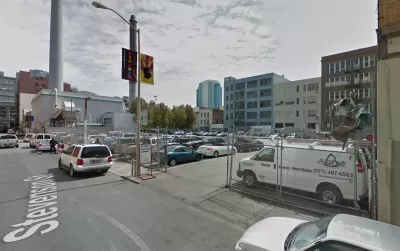A state court has ruled in favor of the San Francisco Board of Supervisors’ efforts to block a development project despite the state’s efforts to intervene.

California is in the midst of a singularly consequential experiment with state preemption and local control. Planetizen has been tracking the so-called “builder’s remedy,” which is designed to hold local governments accountable for failing to plan for enough housing development to accommodate the state’s population.
The most recent mainstream media attention to the builder’s remedy, an article by Liam Dillon published by the Los Angeles Times at the end of October, noted that the legality of the state’s new housing policy regime had yet to be contested in court.
Fast forward a few weeks and Chris Elmendorf, a law professor at the University of California, Davis who has positioned himself at the forefront of the development debate in California, writes that a state court recently delivered a blow to the state’s hopes of forcing local governments to plan for more development.
In a paywalled article for the San Francisco Chronicle, Elmendorf explains the court ruling regarding the “infamous 469 Stevenson project in San Francisco,” a project described in a recent paywalled article by J.K. Dineen as a “poster child for the insanity” of San Francisco housing politics.
“The developer seeks to replace a valet parking lot with 500 homes, many affordable, just one block from a BART station and in a priority development area as identified by the region’s climate plan,” writes Elmendorf.
A “neighborhood gadfly” convinced the San Francisco Board of Supervisors to reverse the approval for the project, according to Elmendorf’s telling of the episode, and demanded a development deal that would include analysis of potential gentrification effects of the project, while downsizing the project and donating some of the land on the parcel to the city.
“In response, Gov. Gavin Newsom’s housing enforcement team launched an investigation. It called the supes’ decision an ‘effective denial’ and warned that they may have violated the Housing Accountability Act, which says that cities generally can’t deny or downsize housing projects that comply with whatever rules are in place at the time the project application was submitted,” explains Elmendorf.
A recent ruling by a state court, however, throws out the state’s intervention.
“State housing laws, she ruled, do not apply to a project until after a city ‘certifies’ the project’s environmental review. Under the logic of this ruling, years may pass — or decades — and still the project proponents have no legal recourse — even if the city’s demands for additional study are frivolous, have nothing to do with the environment or constitute a transparent ruse to pressure the developer,” according to Elmendorf. “Although CEQA puts a one-year limit on environmental review, the court held that this deadline is just advisory and that courts have no authority to order a city to take any action on a project — or even to review the city’s demands — while the environmental review is ongoing.”
California State Senator Scott Wiener is quoted in the article comparing the “outrageous” decision to the ruling that almost forced the University of California, Berkeley to reduce enrollment by thousands due to a CEQA ruling by a state court. According to Elmemdorf, there is still a way forward for this development proposal, namely an appeal of the ruling. The builder’s remedy might require a new state law, modeled on AB 2656, written by planning think tank SPUR and Assembleymember Phil Ting, to inoculate itself from similar state rulings in the future.
FULL STORY: How San Francisco’s infamous 469 Stevenson project just helped gut California’s housing laws

Planetizen Federal Action Tracker
A weekly monitor of how Trump’s orders and actions are impacting planners and planning in America.

San Francisco's School District Spent $105M To Build Affordable Housing for Teachers — And That's Just the Beginning
SFUSD joins a growing list of school districts using their land holdings to address housing affordability challenges faced by their own employees.

The Tiny, Adorable $7,000 Car Turning Japan Onto EVs
The single seat Mibot charges from a regular plug as quickly as an iPad, and is about half the price of an average EV.

With Protected Lanes, 460% More People Commute by Bike
For those needing more ammo, more data proving what we already knew is here.

In More Metros Than You’d Think, Suburbs are Now More Expensive Than the City
If you're moving to the burbs to save on square footage, data shows you should think again.

The States Losing Rural Delivery Rooms at an Alarming Pace
In some states, as few as 9% of rural hospitals still deliver babies. As a result, rising pre-term births, no adequate pre-term care and "harrowing" close calls are a growing reality.
Urban Design for Planners 1: Software Tools
This six-course series explores essential urban design concepts using open source software and equips planners with the tools they need to participate fully in the urban design process.
Planning for Universal Design
Learn the tools for implementing Universal Design in planning regulations.
Smith Gee Studio
City of Charlotte
City of Camden Redevelopment Agency
City of Astoria
Transportation Research & Education Center (TREC) at Portland State University
US High Speed Rail Association
City of Camden Redevelopment Agency
Municipality of Princeton (NJ)





























